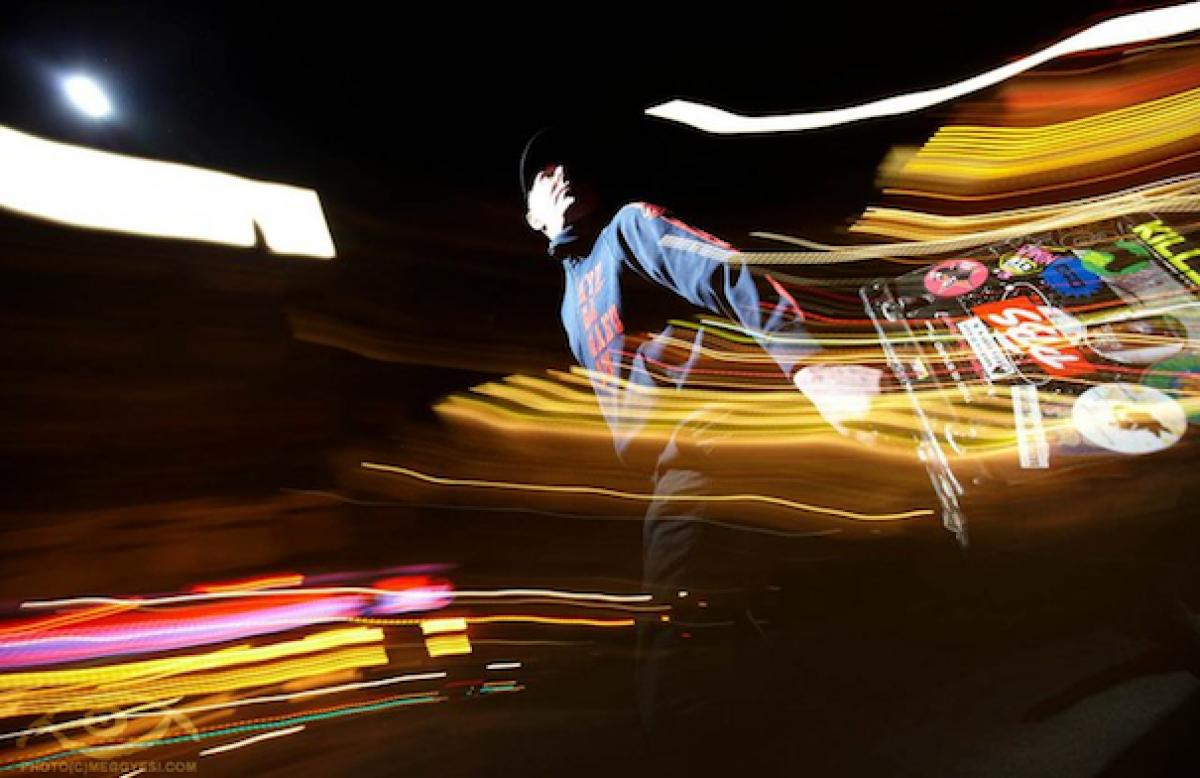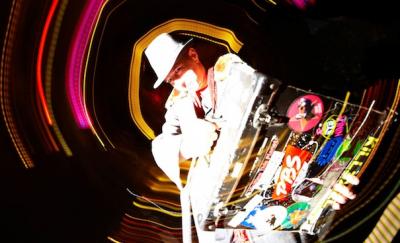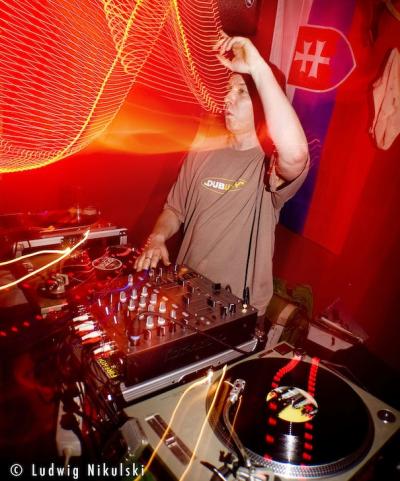
Sounds from the MIDI East
The MIDI East project not only takes advantage of the new ways in which music is distributed but also involves the use of an «old» technology (MIDI) to provide music makers with a novel, shared system of music creation. The project proposed by Brian May/DJ Delay is an example of the sonic and expressive breadth that can be attained by working from Middle-Eastern music MIDI files. The mesmerizing Turkish cumbia that makes part of the first MIDI East project EP was released in May 28. Have some tasters and read the interview recently did via mail exchange.
[DJ Delay]: At a basic level, the MIDI East project is dealing with an online library of around 9000 midi files of mostly turkish/east euro traditional music. I’ve been active in what could be described as electro-folk for around 7 years now and in this world we’re usually dealing with varying contemporary (or not so) versions of trad-folk in a modern clubbing context.
The electronic productions often sample the same past or contemporary greats and therefore buy into paying homage and icon worship, restricting movement out of the past and enforcing a kind of sonic tyrannical dogma that we’ve already come to the end of innovation and can only now reference the past ad infinitum.
I wish to reverse this narrowing of the gene pool by drawing attention to this MIDI library as a tool of reinvention and expansive creativity. It can also be seen as truly allowing the traditional music to evolve in line with the times we’re living in.
The 3 main component of the projects are:
1. instructions on how to access the library (it’s been around on various fileshare sites for a few years)
2. an open soundcloud group for producers to post their finished works if they wish (this functions as a replacement to the traditional record label release of a curated v/a compilation)
3. a 4 track EP of my own interpretations of 4 of the midi files.
My personal opinion is that the midi data can be used/edited/manipulated/reshaped etc in so many ways that it has many more potential for innovation than the well worn remix/cover version/mash up practices of the last few decades. Where I’m at right now is 4 weeks away from the online release through my own label and getting together music industry style publicity for that. Some producers who have joined in so far are DJ Rupture, Zeb, Hifana, Jammin’ Unit, Deadbeat, Greg Hunter, Watcha Clan and Nickodemus.
[Cumbiónico]: This is a very interesting project. One of the things that makes it appealing, to me at least, is that MIDI technology has not been targeted by copyright enforcers to the same extent sampling has, and, therefore, allows for a wider range of creative liberties.
[DJD]: Yes indeed. this one has been ignored by lawyers for the simple fact that there is no commerce involving midi files. if there was an industry with significant amounts of money involved, the lawyers would be there. Specifically with this project – the files were found as-is with no authorship written anywhere. The original performer (solo parts and a few rhythmical parts are clearly ‘actually’ played rather than sequenced in most of the files) therefore cannot be actively traced.
[Co]: Let me ask you a few questions (some are a little hard, I’m playing devil’s advocate here!) about the project and the philosophy behind it. Why Middle Eastern music specifically?
[DJD]: One reason – it’s a personal area of interest and I was actually looking out for music from the balkan region when I found this archive. It could have been any other style for this project. It could be possible that somewhere there is an archive of cumbia midi files – however less likely than middle eastern as a huge percentage of bands playing traditional/cultural music in eastern europe/north africa/middle east use large midi keyboards with onboard multi instrumental capabilities.

[Co]: You mention that, at the base of the project, there is a library of 9,000 midi files, and it seems that, for the project to work, there needs to be an important investment of time and effort in turning music into midi files. Don’t you think that prevents the expansion of the project to other music genres? On the other hand, to which other music genres do you think the project could be expanded?
[DJD]: Point 1 – yes it does take time to make the midi file. The project relies upon people’s enthusiasm, energy and love of music. It seems correct to spread this resource as a way of spreading the music, which may not be heard, if not taken and used in this way (and any way that other people will imagine in the future). My point is that Copyright can *stifle* creativity – the opposite of what businesses who profit from copyright law have said and will keep on saying in order to protect their own income, not the income of their writers. This is a case in point. There is potential for people to learn new music, style, perhaps follow on into turkish culture… who knows (it would be disingenuous to speculate – the point here is that a resource is available and each person will take what they need from it and rework it in their own non-dogmatic way).
The project could be expanded under my motivation, or taken up by someone else. Out of curiosity I searched a little wider for just 10 mins and found midi files from india, usa, europe wide……. !
[Co]: Midi technology is great as a light and reliable informational system for transmitting instructions between music devices. Yet, the production of sound is necessarily based in the use of synthesizers and or samplers. Today there is a great deal of integration between midi systems, synthesizers, and samplers that make difficult to get rid of one of them. What are the limits on sampling according to the principles of the MID East project? I mean, are, for example, sampled drum kit sounds, proscribed from the project?
[DJD]: Anything is possible and allowed. Play a drum machine with the melody. Play the drum track straight into a drum sampler. Interpret the melody playing it on a kazoo – rerecording it and doubling with a dubstep synth. Sing. Completely rearrange the tune or mash 4 melodies together. The goal is to open up the mind to possibilities and explore them. I don’t expect everyone to do this of course. Perhaps only 1 in 50 would try such ideas. The only boundaries that exist are in the mind of the music maker.

[Co]: Perhaps one of the factors that has mad sampling technologies successful is their ability to reproduce sound with great expressivity. On the other hand, with MIDI it seems easier to produce mechanical (less «natural») sounding pieces. How to overcome this problem and convince DJs that MIDI can also be expressive? Have you found ways of achieving MIDI expressivity with easiness? Or, to the contrary, is a more mechanical type of music seen as desirable for the MIDI East project?
[DJD]: When you sample you get a lot, especially if you take it from a finished mastered track, not studio recordings of individual instruments. When you sample a finished recording wholesale there’s the vibe of the all performers summed, the skills of the recording engineer, mastering engineer, the sound of the room or environment and in some cases the audience etc. This can make a very weak piece of, lets say, electronic music suddenly seem alive and to have purpose. Instant fix. What tends to happen then is other people use that same recording and then we get the trance like effect of hearing the same slice of time repeated across several tracks.This is, in my opinion, very unhealthy for the listener and producer alike. To create this feeling from the MIDI files of course requires the producer to do a lot of work… record some live musicians perhaps, hopefully the producer can play 1 or more instruments and starts to add their own character to the track, making it less generic. The MIDI files played straight, using the default general midi sounds, appears very plastic and cheesy (except for the live played parts which are characterful, sometimes fantastic, but also often a bit messy). It was not my intention to give easy cookie cutters to whoever has interest, but to provide a raw resource with character and material that is hopefully going to take someone out of their comfort zone…a little or a lot…but with rewarding results after even just a little work.
I hope that the 4 tracks I produced myself show that some ‘expression’ can be wrought from the files. That’s a subjective opinion though which is out of my control!
The best way to get expression into MIDI data is to record it using your favourite midi controller. there are a whole host of different devices today that offer different ways to input musical expression into a software based synth/sampler (or analogue synth via midi-CV conversion, which I also use).

A producer who has mastery or at least a good skill level with the tools they use should be able to make expressive electronic music. It’s worth keeping in mind that musician in Indian classical music, for example, often undergo a year or two of training before they can even touch their instrument. Who’s investing that much study/practice with their electronic gear today? Some, for sure. Many, not. The point is merely that most people outside of natural musical genii need 1000s of hours practice to get that expression flowing no matter what the instrument. Electronic music production in general needs to be looked at with this in mind.
[Co]: Could you tell us more about the future that you envision for music, and the role of producers/composers, and deejays?
[DJD]: Music has always been an essential part of living. Perhaps it’s role has become more one of solely entertainment in the last 70 years but I feel that this trend is reversing and hope for sure that it returns to a more balanced level. I’ve DJed for over 20 years (12 of those on radio as well) and see the role of the dj as being a filter to present music to an audience..using their knowledge of music and awareness of what’s happening in the moment to the best of their abilities. When we’re talking about scratch & trick/etc DJs I think more of performer/musician than straight up vanilla «DJ». However, I produce under a few names and one of them is DJ Delay, so I am guilty of confusing my own definition. I don’t do ‘live’ sets under the DJ Delay name though, for example. A good DJ is hard to find. Perfect example is to note how present John Peel still is in the music world’s consciousness, several years after his death. «All» he did was play other people’s tracks, wasn’t it?
[P.S. From DJ Delay]: Forgot to mention 2 things! With regards to sampling and the ‘vibe’ that goes with any prerecorded audio – 2 of the midi east tracks use the «amen» snare drum sample. It’s a good example of 1 small part of 1 drum loop that just has that extra special something that you can’t put your finger on. It’s been used so extensively that it’s become part of the vocabulary of electronic music (since the mid 90s even). So you could say I’m actually doing what I claim to be working against in that case – if someone wanted to be extremely detailed and picky about it.
Other thing is that the project aims to turn the typical idea of a release upside down, by making an open group for results from people’s interpretations/works from the MIDI files. No curatorial/selection process. No fixed end date. No track limit. The result is dependent upon participation, which could mean any number of tracks from 0 upwards ending up in the soundcloud group.
Through the project I’m taking a position on the creative process in electronic music production, as well as attitudes to + the continuation of traditional music.
Found on our buddy-blog Nucumbiaexperience.
Published on June 23, 2012
Last updated on September 11, 2019
Topics
How can sound & music be preserved and at the same time evolve in line with the present?
Digitization means empowerment: for niche musicians, queer artists and native aliens that connect online to create safe spaces.
How does the artits’ relationship to the gear affect music? How to make the climate change audible?